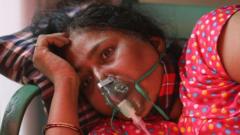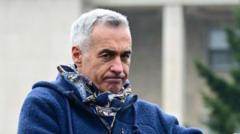This incident has ignited a fervor among Americans frustrated by a healthcare framework that often prioritizes profits over patient care, revealing deep-rooted grievances that transcend political lines.
**Killing of UnitedHealthcare CEO Sparks Outrage Over U.S. Health System Irregularities**

**Killing of UnitedHealthcare CEO Sparks Outrage Over U.S. Health System Irregularities**
The assassination of Brian Thompson, CEO of UnitedHealthcare, exposes widespread discontent with the American healthcare system's complexities and injustices.
The shocking assassination of UnitedHealthcare CEO Brian Thompson in New York City has elicited a wave of anger, casting a spotlight on the pervasive frustrations surrounding the U.S. healthcare system. His death is seen by many as a tragic symbol of the disconnect between insurance companies and those they serve—a sentiment underscored by past protests against UnitedHealth Group and other insurers for allegedly denying essential patient claims.
This summer, over a hundred protesters gathered at UnitedHealthcare's headquarters in Minnesota to voice grievances about "prior authorization" policies, meaning that insurance companies often require pre-approval for treatments, which can delay critical care. Unai Montes-Irueste, a spokesperson for People’s Action, noted that many individuals attending the rally had firsthand experiences of denied claims that left them struggling for medical care.
Thompson’s killing has stoked outrage not just from policy leaders and insurance officials, but also from a broader public that sees the incident as emblematic of the frustrations they face in navigating a flawed healthcare system. Messages left on shell casings found at the crime scene—words like “deny,” “defend,” and “depose”—have drawn the attention of investigators and commentators alike, suggesting that the motives behind the crime may relate to the very tactics many Americans resent in dealing with their health insurers.
Expressing her shock at the crime, Paulette Thompson indicated that her late husband had received threats prior to his death, echoing a security expert's assertion that corporate leaders in the U.S. may face increasing risks from public anger about high healthcare costs.
While industry figures expressed sorrow over Thompson's death, including Michael Tuffin, president of a national insurance association, many members of the public had a starkly different reaction. Online discourse ranged from sardonic remarks to outright celebration of the event, illustrating how deep-set resentment toward the healthcare system effectively united voices across various political spectrums.
Sara Collins from The Commonwealth Fund stressed the complexity of the insurance landscape, noting that many insured adults experience unexpected costs, contributing to a mounting medical debt crisis unique to the U.S. This debt burden is exacerbated by insurers increasingly denying coverage, potentially harming constituents who rely on timely care.
Christine Eibner from the RAND Corporation highlighted the rising trend of treatment denials and high insurance premiums, further solidifying public discontent. With ongoing lawsuits against UnitedHealthcare for improper practices, and investigations into their treatment denial strategies, the case against these corporations has grown, bolstered by personal narratives shared by affected citizens.
As the search for Thompson’s assailant continues, it’s clear that his death has opened a significant dialogue regarding the U.S. healthcare system's structure and ethics, prompting calls for reform that address the frustrations of patients and their advocates, rather than merely appeasing corporate interests.
This summer, over a hundred protesters gathered at UnitedHealthcare's headquarters in Minnesota to voice grievances about "prior authorization" policies, meaning that insurance companies often require pre-approval for treatments, which can delay critical care. Unai Montes-Irueste, a spokesperson for People’s Action, noted that many individuals attending the rally had firsthand experiences of denied claims that left them struggling for medical care.
Thompson’s killing has stoked outrage not just from policy leaders and insurance officials, but also from a broader public that sees the incident as emblematic of the frustrations they face in navigating a flawed healthcare system. Messages left on shell casings found at the crime scene—words like “deny,” “defend,” and “depose”—have drawn the attention of investigators and commentators alike, suggesting that the motives behind the crime may relate to the very tactics many Americans resent in dealing with their health insurers.
Expressing her shock at the crime, Paulette Thompson indicated that her late husband had received threats prior to his death, echoing a security expert's assertion that corporate leaders in the U.S. may face increasing risks from public anger about high healthcare costs.
While industry figures expressed sorrow over Thompson's death, including Michael Tuffin, president of a national insurance association, many members of the public had a starkly different reaction. Online discourse ranged from sardonic remarks to outright celebration of the event, illustrating how deep-set resentment toward the healthcare system effectively united voices across various political spectrums.
Sara Collins from The Commonwealth Fund stressed the complexity of the insurance landscape, noting that many insured adults experience unexpected costs, contributing to a mounting medical debt crisis unique to the U.S. This debt burden is exacerbated by insurers increasingly denying coverage, potentially harming constituents who rely on timely care.
Christine Eibner from the RAND Corporation highlighted the rising trend of treatment denials and high insurance premiums, further solidifying public discontent. With ongoing lawsuits against UnitedHealthcare for improper practices, and investigations into their treatment denial strategies, the case against these corporations has grown, bolstered by personal narratives shared by affected citizens.
As the search for Thompson’s assailant continues, it’s clear that his death has opened a significant dialogue regarding the U.S. healthcare system's structure and ethics, prompting calls for reform that address the frustrations of patients and their advocates, rather than merely appeasing corporate interests.























